We review VPNs independently, but we may earn commissions if you buy a VPN via our links.
Avast SecureLine VPN Review

Streaming
Avast VPN Only Streams Select Regional Libraries
Here’s a list showing the popular streaming services that Avast SecureLine VPN unblocks:
| Streaming Platform | Works with Avast SecureLine VPN |
|---|---|
| Amazon Prime Video | Yes |
| BBC iPlayer | Yes |
| Channel 4 | Yes |
| Disney+ | No |
| Hotstar India | No |
| Hulu | No |
| ITVX | No |
| Max | No |
| Netflix US | No |
Avast Secure Line has a number of servers optimized for video streaming, although they don’t specify which streaming sites they’re designed to unblock.
In any case, we tested all these servers with major streaming services like Netflix, HBO Max, Hulu, Amazon Prime Video, BBC iPlayer, and more.
We found Avast SecureLine works with Amazon Prime Video, BBC iPlayer, and All 4.
The UK streaming server easily bypasses Channel 4 geo-blocks and accesses BBC iPlayer. It didn’t work with UK Netflix, though.
Amazon Prime Video worked on the US Miami server, but not the Gotham City, New York, or Seattle ones.
In addition, the Germany streaming server worked with German Netflix.
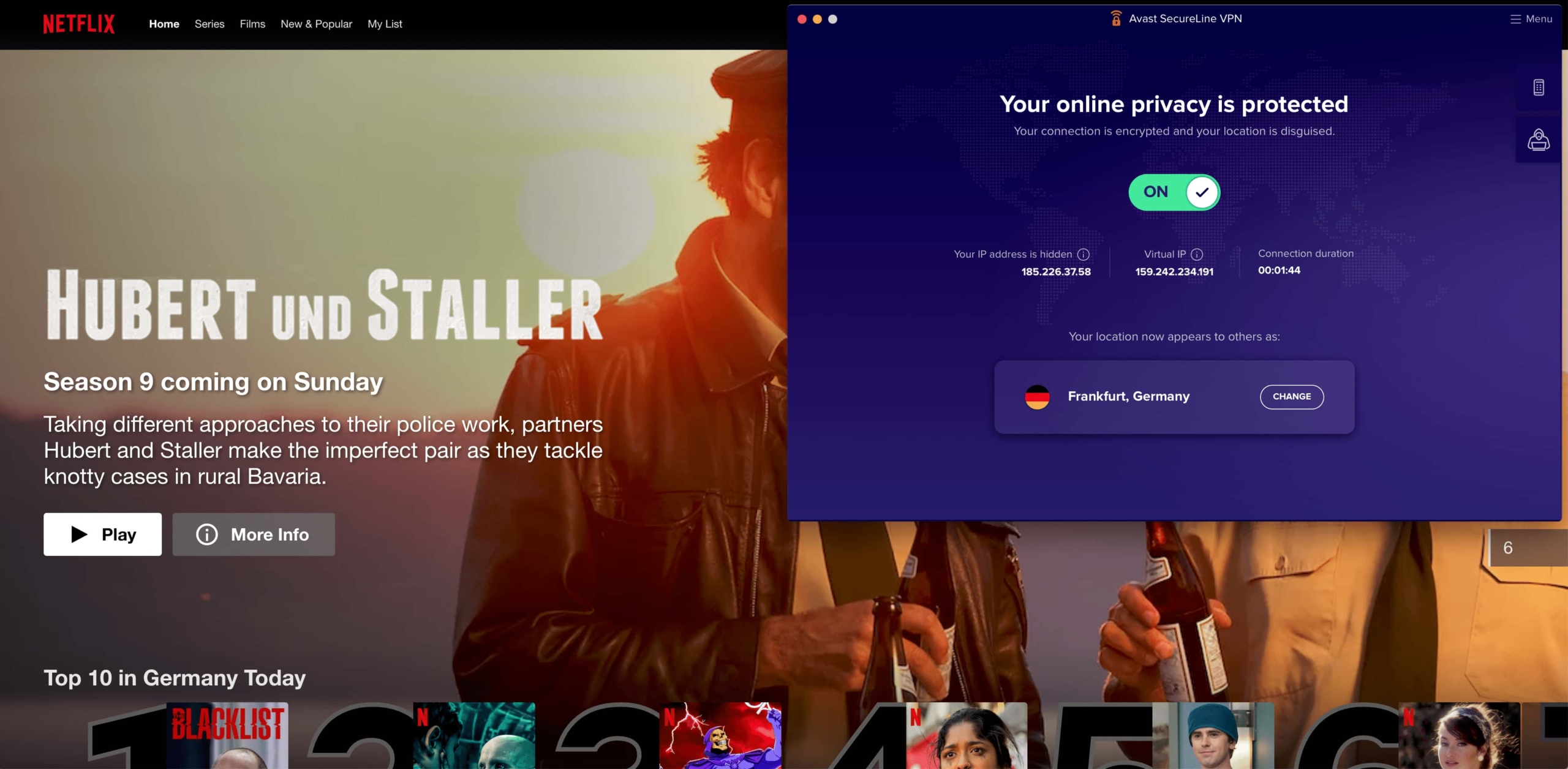
Avast SecureLine beat German Netflix blocks easily in our tests.
Avast VPN Doesn’t Unblock US Netflix, Disney+ and HBO Max
Sadly, none of Avast’s four US streaming servers could stream US Netflix.
None of the streaming-optimized servers worked with Disney+, either. Both HBO Max and Hulu detected our Avast VPN connections and blocked them, too.
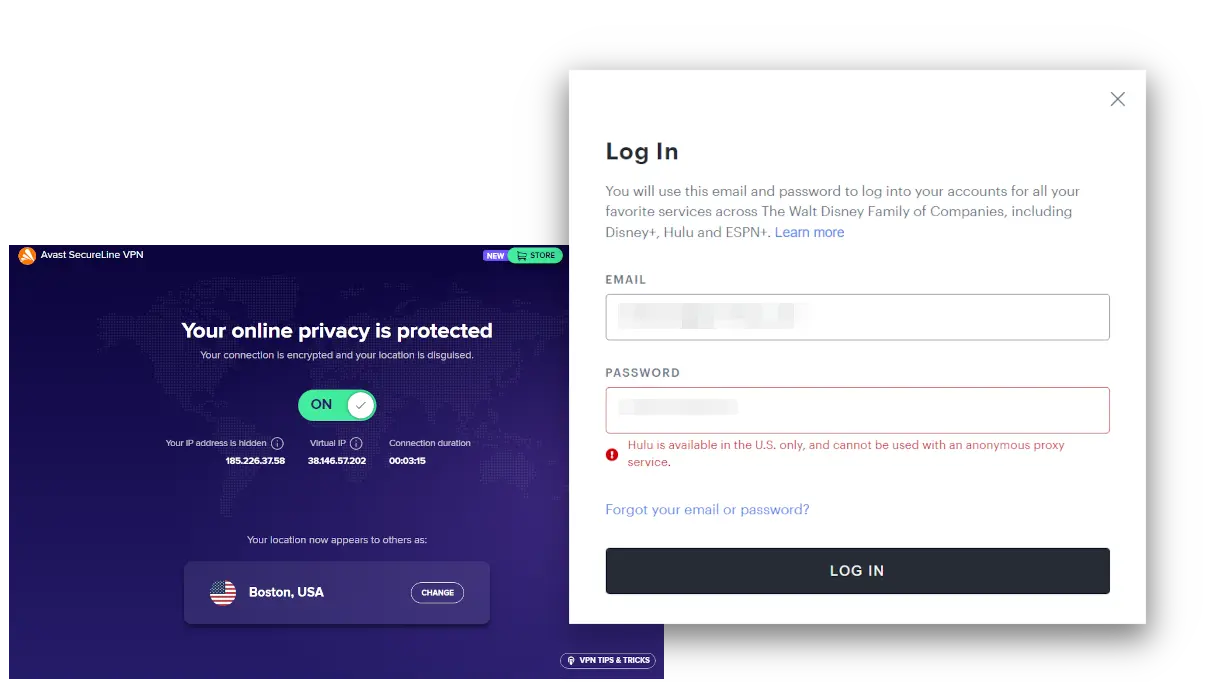
Our streaming tests found Avast VPN failed to unblock Hulu.
Based on our latest findings, there are far more effective streaming VPNs than Avast VPN.
Speed
Fast Local Speeds, but Poor International Connection Speeds
We tested Avast SecureLine on servers in six continents to evaluate its speed performance. Here’s a table showing the full speed results:
A short-distance speed loss of 97Mbps is an excellent outcome. For local speed test results, it’s one of the best we’ve seen.
However, it’s not all positive: Avast’s long-distance speeds are quite slow when compared to the fastest VPNs.
To see what we mean, use the bar chart below to compare Avast’s local and long-distance speed results against a few top-performing VPNs, like ExpressVPN and StrongVPN:
As you can see, Avast’s local speeds are very fast. But it’s long-distance connections are well behind. The best VPN for international connections is Hotspot Shield, which is only 1% slower than your normal internet speed wherever you connect to.
EXPERT ADVICE: For optimal speed, we recommend using Avast Mimic protocol to connect to distant server locations, and OpenVPN to connect locally. On macOS, which doesn’t have OpenVPN, we recommend using Avast Mimic all the time.
Privacy & Logging Policy
Avast VPN Logs Too Much Data & Has Handed It Over
Here’s a table summarizing the information that Avast SecureLine logs:
| Data Type | Logged by Avast SecureLine VPN |
|---|---|
| Account Information | Yes |
| Browsing Activity | No |
| Date of Last Connection | No |
| Device Information | Yes |
| DNS Queries | No |
| Individual Bandwidth Usage | Yes |
| Individual Connection Timestamps | Yes |
| ISP | No |
| Number of Simultaneous Connections | No |
| Originating IP Address | No |
| VPN Server IP | No |
| VPN Server Location | No |
Avast’s VPN privacy policy is clearly written and transparent, but the service logs more data than we’re comfortable with.
Avast’s servers store your connection data for 35 days, and any client data (account information) for up to two years. There’s no real justification for this practice.
At least Avast SecureLine doesn’t store your original IP address, DNS queries, or browsing history. This is the most sensitive information that no VPN should keep.
Moreover, Avast has a privacy policy for its VPN specifically (and another for its browser extension), and not a vaguely worded policy for all Avast products, like other antivirus companies have.
The problem is the content of the privacy policy. Sadly, Avast makes it abundantly clear it will hand over your data to government agencies. This is a serious cause for concern.
Avast VPN Operates Under EU Jurisdiction
Avast RSO is a Czech cybersecurity company founded in 1988. It’s best known for its antivirus software, but now sells a range of cybersecurity products. It also owns the HideMyAss! (HMA) and AVG VPN services.
Avast is still headquartered in Prague, Czechia, and is therefore subject to invasive EU data retention laws and intelligence agreements with privacy-unfriendly nations like the United States.
In its own transparency report, Avast admitted to providing data to law enforcement in response to legal requests.
In 2017, Avast handed over information concerning 41 of its users – 31% of all legal requests that year.
Its co-operation with law enforcement has since dropped to 0% for 2021 (that could be due to an exodus of trusting users, however).
But it shows that Avast has data to hand over in the first place, and that its legal jurisdiction is inappropriate for a VPN.
Warrant Canary Has Not Been Updated
Avast introduced a tri-monthly warrant canary to warn users of gag orders. However, since October 1 Avast has not updated its warrant canary and the URL is now inactive. It’s quite possible that it has received a gag order and has been compromised.
Avast Has a Privacy-Unfriendly History
Not only does Avast VPN log too much connection data, and is based in a privacy-unfriendly nation, but the company has also been caught harvesting user browsing data.
In December 2019, Mozilla removed Avast’s antivirus browser extensions for breaking its privacy rules.
The antivirus extension had been in fact harvesting and sending data back to Avast. This data included websites visited, search terms, videos watched, links clicked, and unique device IDs.
In January 2020, it was reported that personal data harvested by free Avast add-ons was being monetized and sold to tech companies like Google.
While Avast has abandoned this practice, which doesn’t apply to the VPN, service, no privacy company should engage in such activity in the first place.
Torrenting
Fast Torrent Speeds, but Avast’s Logging Policy Is a Concern
Here’s a quick summary of showing how Avast VPN performed in our torrenting tests:
| Torrenting Attribute | Result |
|---|---|
| Average Download Bitrate | 9.29MiB/s |
| No. of P2P Servers | 700 |
| Logging Policy | Some User Logs |
| Kill Switch | Yes |
| Port Forwarding | No |
Avast lists eight servers that are optimized for P2P activity. These are:
- Czech Republic
- France
- Frankfurt, Germany
- London, UK
- Miami, US
- Netherlands
- New York, US
- Seattle, US
Testing torrent speeds on these P2P servers, we recorded an average download bitrate of 9.29MiB/s. This is up there with the best torrent VPNs. For example, PIA VPN has an average bitrate of 9.6MiB/s.
The VPN possesses a kill switch, too, ensuring there aren’t accidental data leaks or exposures while you torrent files.
While it’s torrenting speeds are fast, Avast VPN logs too much data. It’s timestamp logs, data harvesting scandal, and cooperation with government agencies mean Avast SecureLine is not safe for torrenting.
The VPN also offers no extra features for torrenters either, like a SOCKS5 proxy, or port forwarding.
Security & Technical Features
Avast VPN Is Secure, but Basic
| Protocols | Available in Avast SecureLine VPN |
|---|---|
| IKEv2/IPSec | No |
| L2TP/IPSec | Yes |
| OpenVPN (TCP/UDP) | Yes |
| Proprietary | Yes |
| WireGuard | Yes |
| Encryption | Available in Avast SecureLine VPN |
|---|---|
| AES-128 | No |
| AES-192 | No |
| AES-256 | Yes |
| Blowfish | No |
| ChaCha20 | Yes |
| Security | Available in Avast SecureLine VPN |
|---|---|
| Diskless Servers | No |
| DNS Leak Blocking | No |
| First-party DNS | No |
| IPv6 Leak Blocking | No |
| Supports TCP Port 443 | No |
| VPN Kill Switch | Yes |
| WebRTC Leak Blocking | No |
| Advanced Features | Available in Avast SecureLine VPN |
|---|---|
| Ad Blocker | No |
| Dedicated IP | No |
| Double VPN | No |
| SOCKS | No |
| Split Tunneling | Yes |
| Static IP | No |
| Tor over VPN Server | No |
| Tracker Blocker | No |
Avast VPN Uses a Proprietary VPN Protocol
Avast VPN has an experimental in-house proprietary protocol called Avast Mimic. While the protocol delivers fast speeds, we contacted Avast VPN and were given an unsatisfactory explanation of how the protocol functions.
Moving forward, we’d like a transparent explanation of how the protocol protects your data. When it comes to VPNs, you want data protection to be reliable, not experimental.
OpenVPN is now available as an alternative protocol on all desktop and mobile devices. Avast VPN also supports WireGuard on Windows and Android. However we’d like to see this across all apps.
Safe Practices, but Too Basic
Avast SecureLine uses the industry-standard AES-256 encryption and comes equipped with a kill switch across all of its applications. The kill switch is off by defeault so you’ll need to manually turn it on.This shows that it has a solid grasp of VPN security.
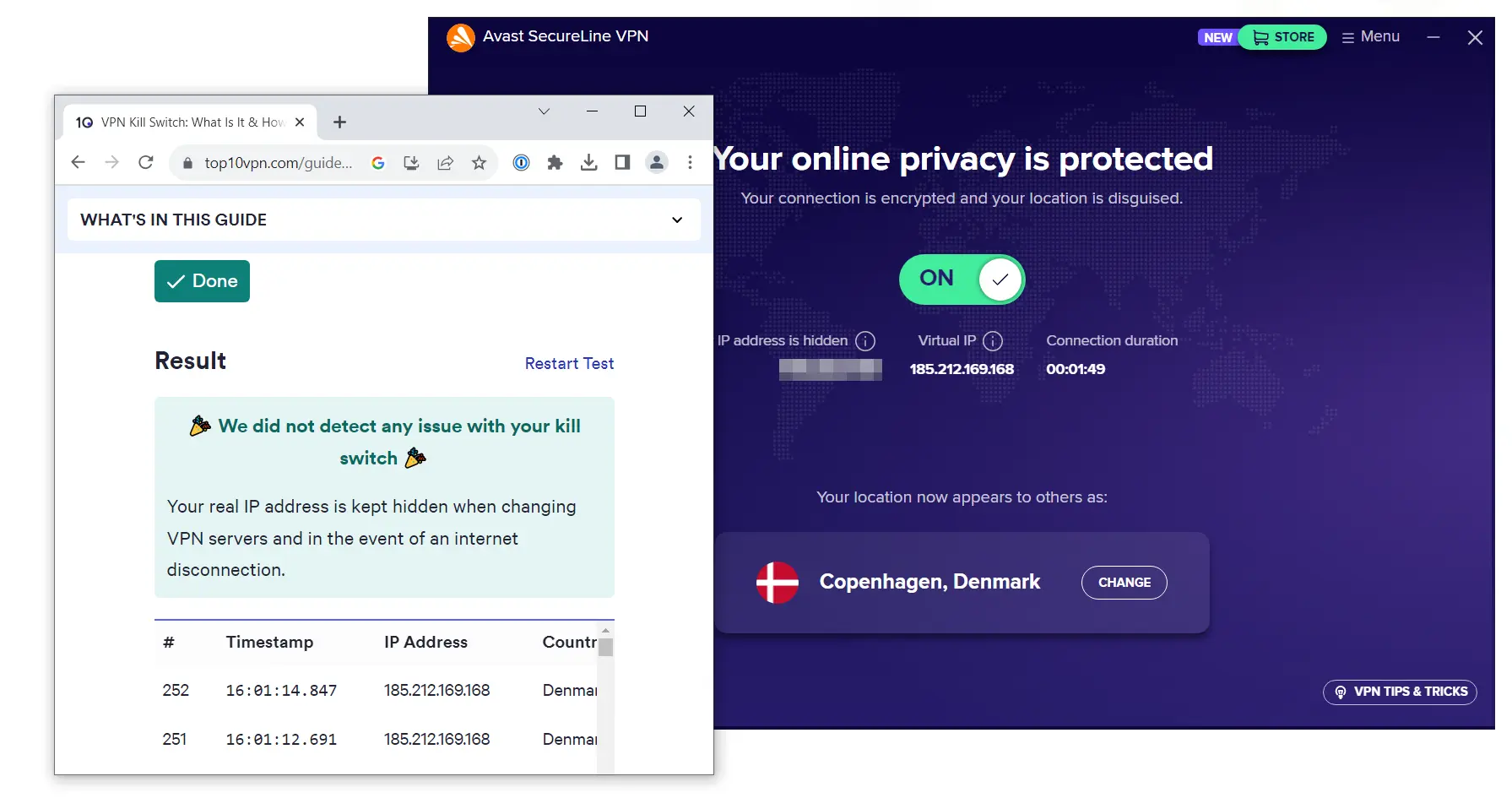
Avast VPN passed our kill switch tests by concealing our IP address.
However, Avast is basic compared to many leading VPNs, which are moving to RAM-only servers and open source apps. Avast VPN would benefit from advanced and customizable protection measures like a malware and ad blocker, DNS leak protection, double VPN (multi-hop), and Onion over VPN.
One impressive feature is that Avast VPN allows you to use a free password leak detector, to check whether passwords associated with your email have been exposed by data leaks or hacks. All you have to do is insert an email.
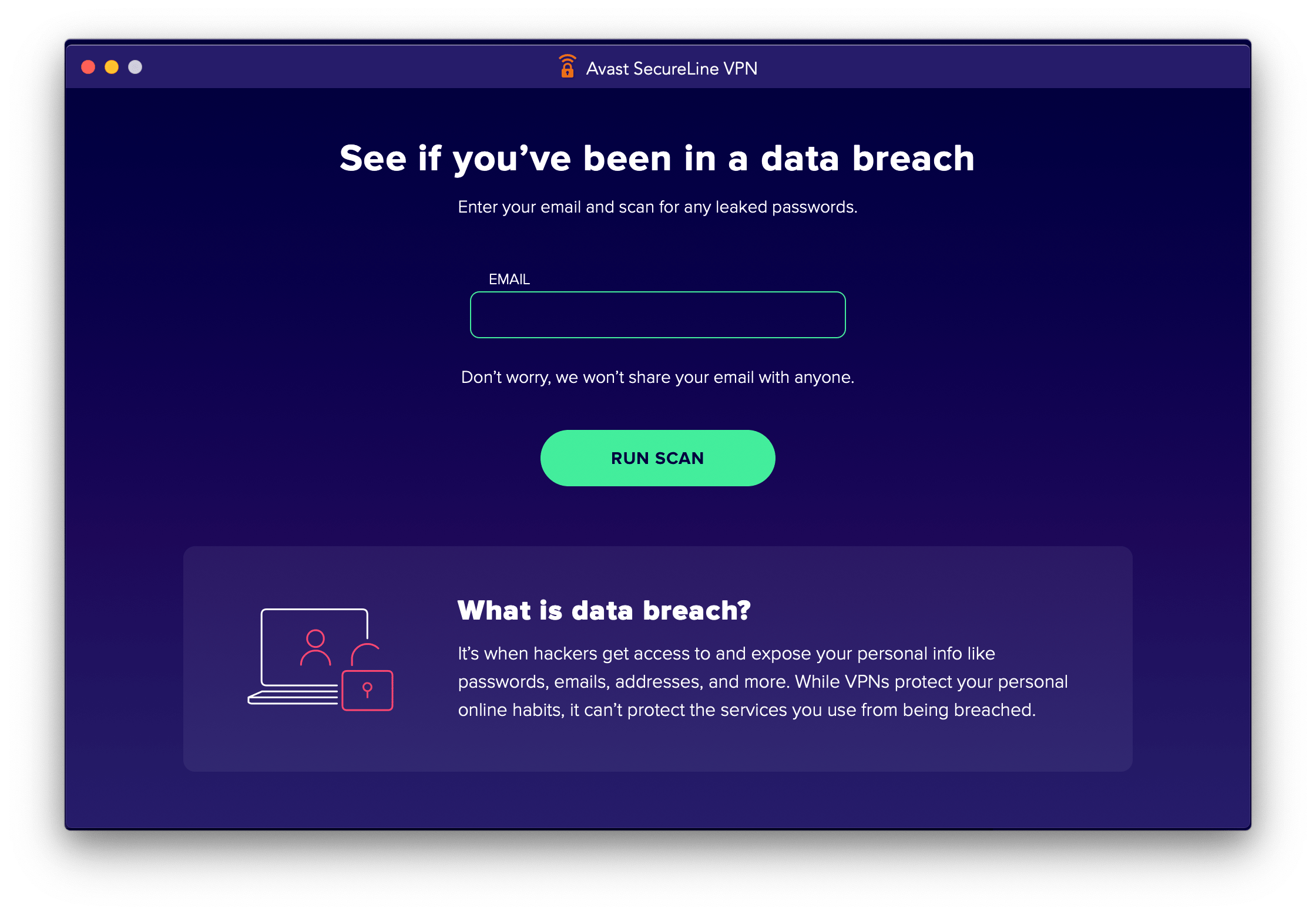
Avast SecureLine has a free password leak detector.
Smart Mode Is a Useful Split Tunneling Tool
Avast SecureLine has a feature called Smart Mode, which is essentially an automatic split tunneling feature that selects which websites and apps are encrypted through the VPN tunnel and which are not.
Avast says that its Smart Mode can “tell when you’re connecting to a sensitive site,” closing the VPN session after you leave. This is usually for banking websites and torrent sites. It also knows whether you’re using public WiFi.
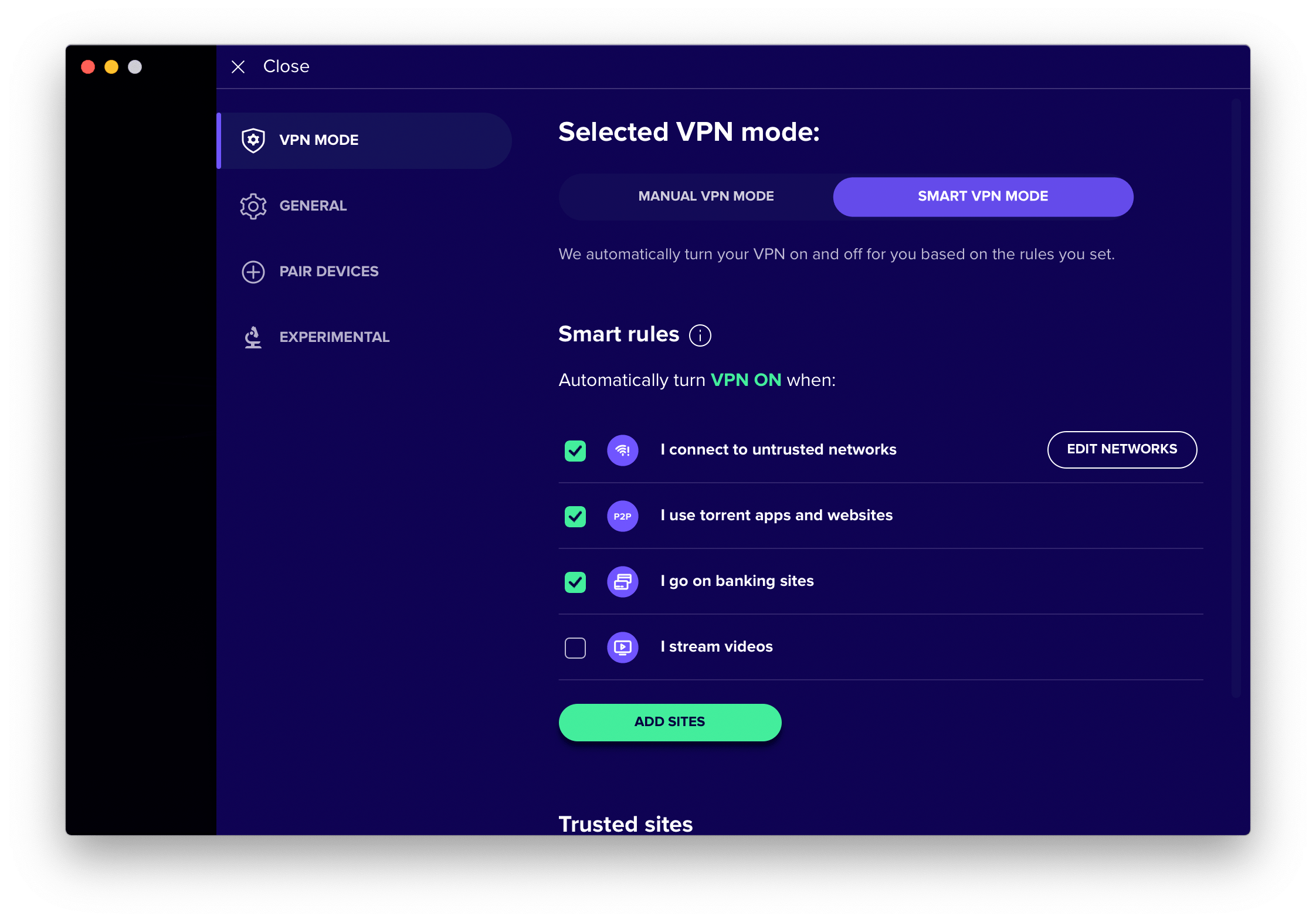
Smart VPN Mode is a split tunneling feature that can work automatically or manually.
You can also customize this feature, choosing which websites you want to encrypt or not. In this way it’s like a regular manual split tunneling tool.
Credit to Avast that this is available on Mac; it’s rare to find a functioning split tunneling feature on Apple devices. Even top VPNs like ExpressVPN and NordVPN don’t have one.
Avast Passed or IPv6, DNS & WebRTC Leak Tests
We ran Avast SecureLine VPN through our IP, DNs and WebRTC leak tests. The VPN passes all tests, meaning we recorded no network traffic leaks and all our personal information we hidden.
Bypassing Web Censorship
Not Reliable in China
We regularly test Avast SecureLine with our remote PC in Shanghai. Sadly, we haven’t been able to connect to servers as consistently as we could before using the VPN.
In the past year, it’s only got a 30% success rate in circumventing the Great Firewall. Avast SecureLine isn’t featured in our top choices for China.
A majority of VPN websites are actually blocked in China. Because of that, you’ll have to download a VPN before going into the country, or while using another VPN that works within the country.
Avast might work against censorship in countries like Russia and Turkey, which have less robust crackdown methods than China. However, we recommend opting for more effective alternatives like Hide.me, Windscribe Free, or Astrill VPN.
Server Locations
Small Server Network Only Covers 34 Countries
Avast SecureLine VPN runs 700 servers across 34 countries. This is a disappointing range of server locations.
We expect top VPN networks to cover many more countries, like ExpressVPN’s 106 countries, or a CyberGhost’s 12,000 nations.
Moreover, Avast’s server network is largely concentrated in Europe and the US. There aren’t many servers covering Asia, Africa, and the Middle East.
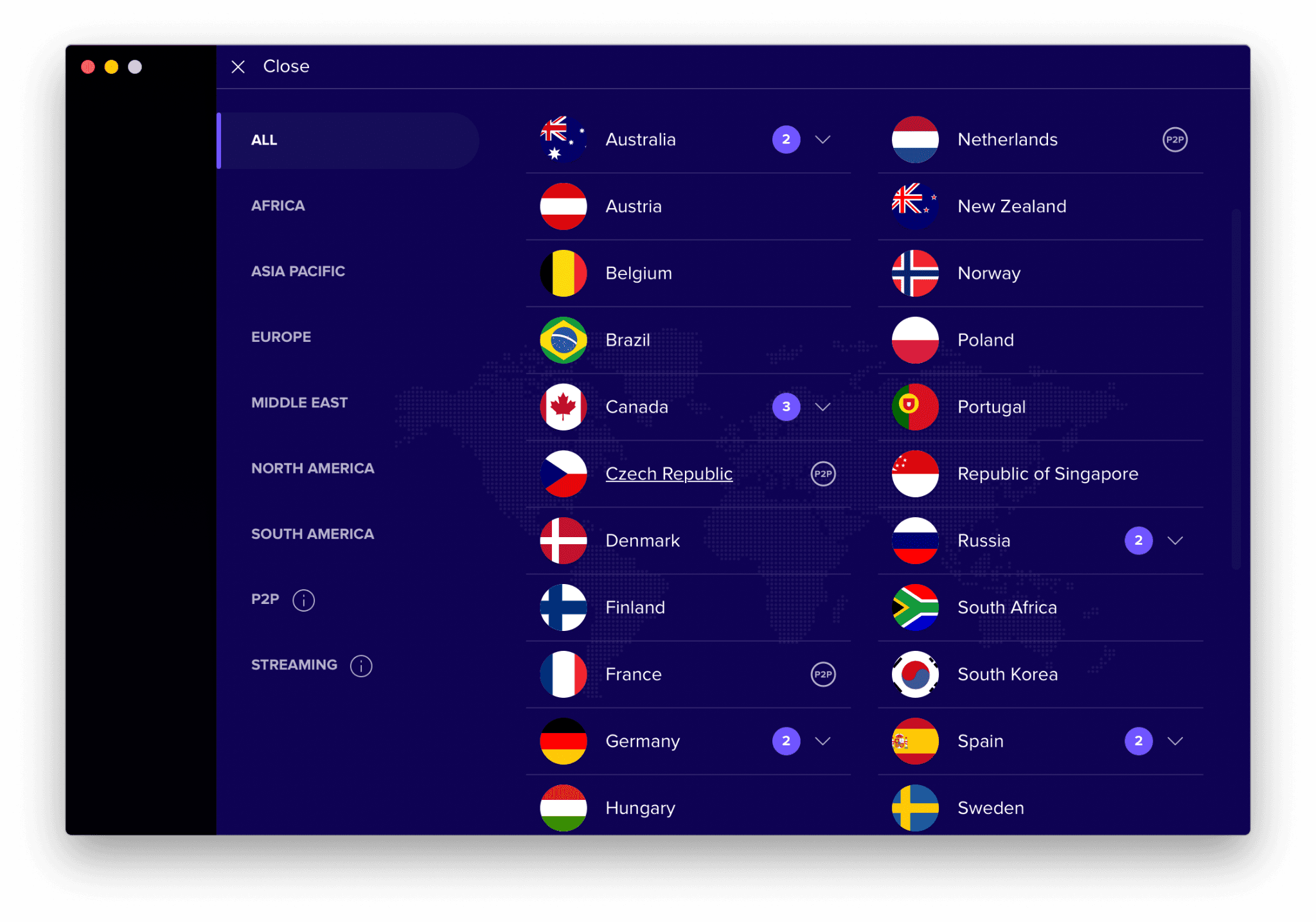
Avast VPN’s server list.
City-specific selection is also limited with Avast VPN. You can currently select different city servers in the following countries:
- Australia
- Canada
- Germany
- Russia
- Spain
- UK
- US
That’s not a lot of choice, but at least there are city-level options in large countries like the US, Canada, and Australia.
Avast’s Server Network Is Part-Owned Part-Rented
When asked, Avast stated they both own and rent VPN servers. The company refused to disclose any more information for “security reasons.”
We don’t know which servers are owned by Avast and which are rented.
While it’s not uncommon for a VPN service to rent servers for greater coverage, it does increase the risk of your data being mishandled by third-parties.
This isn’t an issue if the VPN is diligent when choosing who to work with. Having said that, a few trustworthy VPNs have fallen victim to poor third-party server management, including NordVPN and Windscribe.
For security reasons, some VPNs choose to operate an entirely self-owned infrastructure, such as IPVanish’s server network.
Price & Value
There Are Better & Cheaper VPNs Than Avast VPN
The cheapest monthly price you can get Avast SecureLine VPN for is $3.75. You’ll have to commit for three years, though, and pay as $135.00 upfront.
Currently, there is no pay-monthly subscription plan available, which is a shame.
At least, Avast has simplified its pricing plans, which used to be based on device allowance and platform-specific requirements. It was far too complicated.
12 Month(s)
$4.60/mo
Billed $55.20 the first year, $89.99 thereafter2 Year(s)
$4.20/mo
Billed $100.80 the first 2 years, $179.99 thereafter3 Year(s)
$3.75/mo
Billed $135.00 the first 3 years, $269.99 thereafter
All the above pricing plans let you use the VPN on up to 10 devices at once.
Payment & Refund Options
You can pay for Avast VPN with PayPal, American Express, VISA and Mastercard.
American Express
Mastercard
PayPal
Visa
We would like to see more privacy-friendly payment methods included, such as cryptocurrency and cash payments. When reviewing Mullvad, we found it’s the only service to offer cash payments to its customers.
Avast VPN’s 30-Day Money-Back Guarantee
All of Avast SecureLine’s subscription plans come with a 30-day money back guarantee.
To claim a refund within 30 days of purchase, you will have to give a reason so it’s not strictly ‘no questions asked’ like most top VPN services.
Be aware, though, that the 30-day refund promise doesn’t apply if you bought the VPN via a retail store, a reseller, or the App Store. App Store purchases are in fact subject to Apple’s terms and conditions.
Avast VPN’s 7-Day Free Trial
Avast also offers a genuine seven-day free VPN trial. You don’t have to submit any payment details to access the free trial, and there are no restrictions on data and server usage.
However, while this is good way to test Avast VPN for free, the deficiencies of the VPN service mean there are better VPN free trials for you.
Device & OS Compatibility
Apps for the Most Popular Devices Only
Apps
Avast Secure Line is available on the following platforms:
Windows
Mac
iOS
Android
Outside of the major platforms listed above, Avast VPN offers very little device compatibility.
There are no native applications for Fire TV Stick or Android TV, no router configuration, and no Smart DNS functionality. In other words, using the VPN on your TV is practically impossible.
So much so that Avast directs users to its partner VPN, HideMyAss. This is simply unacceptable for existing Avast subscribers. Instead, Avast needs to improve its device support.
Avast Supports 10 Simultaneous Connections
If you purchase an Avast SecureLine Multi-Device subscription, you can use Avast VPN on up to 10 devices at the same time. This is a very generous amount, although some VPNs like Surfshark allow an unlimited number of connections at once.
Browser Extensions
Chrome
Firefox
Avast SecureLine VPN provides proxy browser extensions for Google Chrome and Mozilla Firefox. Both browser add-ons are easy to set up and use.
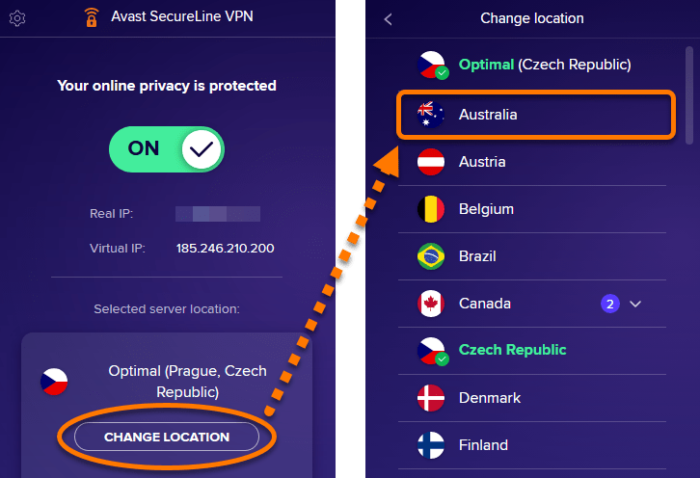
The Avast VPN browser extension.
But, both extensions are proxies, and won’t fully encrypted your web traffic like VPN software does. Additionally, they won’t change your IP address on your entire device, just on your web browser.
Ease of Use
Avast VPN Is Useful for Beginners
Avast SecureLine is very simple to understand and use. The apps consist of very little. There is a home screen with a large connect button and a limited selection of settings and advanced options.
The apps are almost completely the same across devices, which is quite rare. Avast SecureLine is certainly user-friendly and so a viable option for VPN newcomers.
Avast VPN’s Desktop Apps: Windows & macOS
Avast SecureLine is identical on Windows and macOS. Both have easy-to-navigate interfaces. Avast’s Smart Mode is available on both, which is noteworthy as split tunneling is rarely available on Mac.
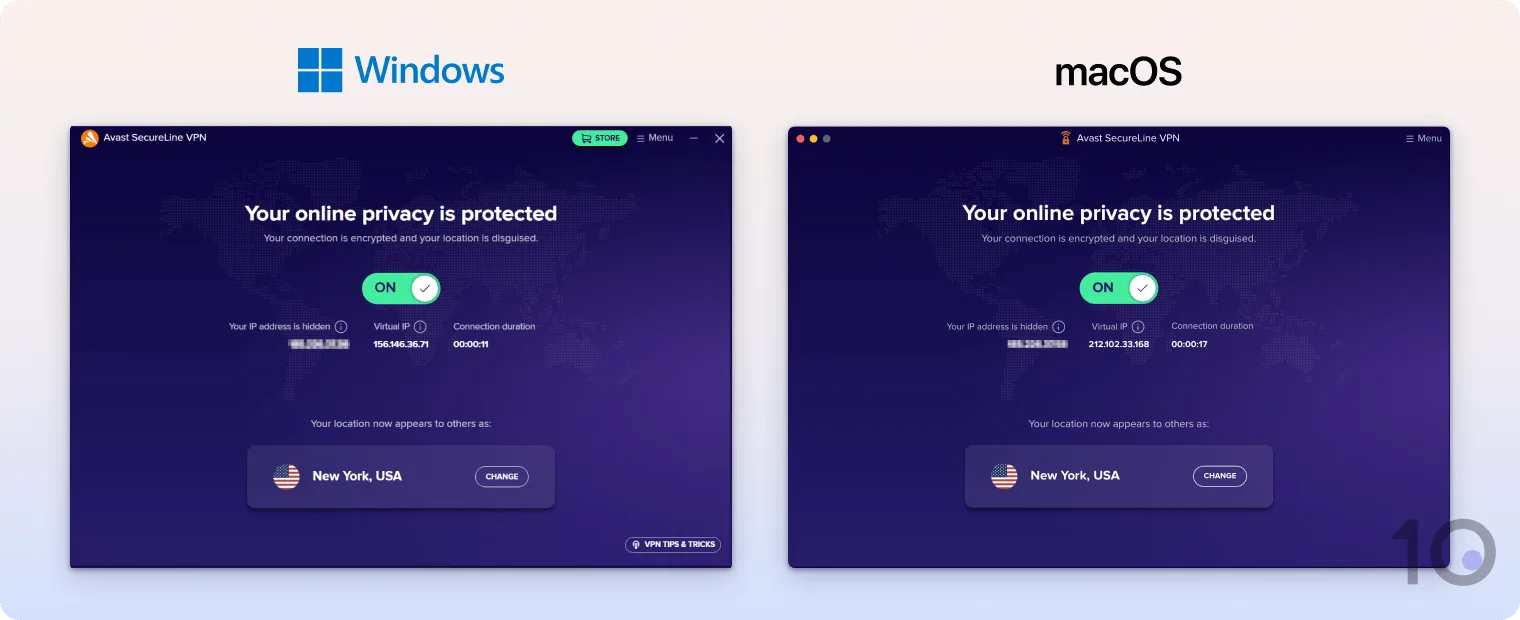
However, Windows has OpenVPN protocol whereas Mac does not. Mac is automatically set to IPSec and you can change to Avast Mimic only. This is done by using the burger menu and heading to Preferences > Experimental.
Avast VPN’s Mobile Apps: Android & iOS
Avast SeucreLine’s Android app comes with a kill switch, split tunneling, and an auto connect feature. It uses the OpenVPN protocol as default.
You can toggle off an automatic sharing of app-usage data that goes to third parties. It shouldn’t be there in the first place, really. At least, it should be an opt-in option.
The iOS app, on the other hand, barely comes with anything. None of its servers are listed as P2P servers and it has no customizable settings at all – not even an auto-connect feature.
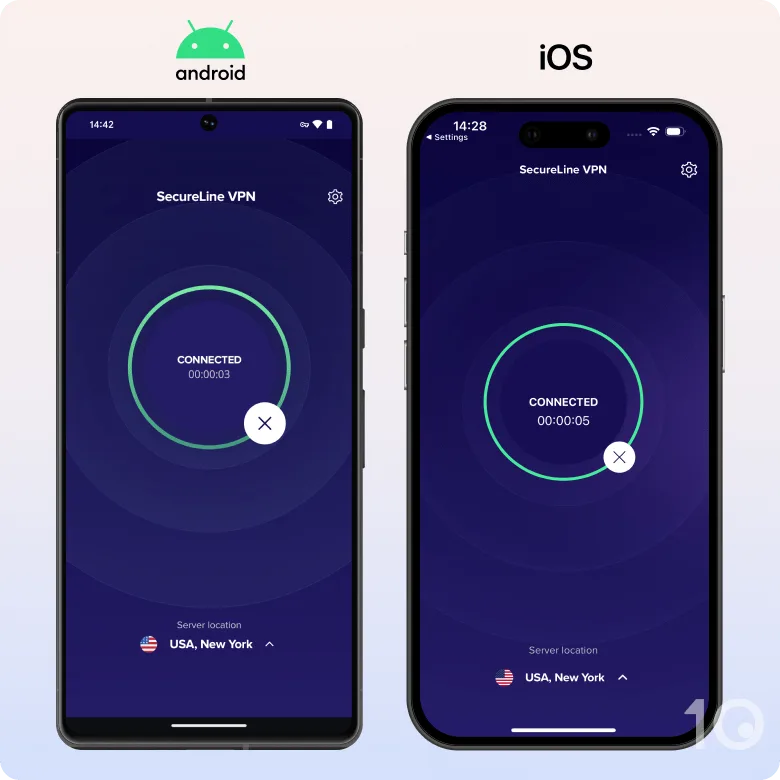
There’s a Help FAQ within both apps, but it’s pretty basic. You’ll also find a link to the Avast Forum and a contact support option.
The mobile apps have the same number of servers as the desktop, but you cannot change your protocol on either mobile version. This is a big drawback.
As it stands, Avast SecureLine is more advanced and customizable on desktop than on mobile. This is typically the case with most VPN services.
Customer Support
Good 24/7 Live Chat Support
| Customer Support | Available in Avast SecureLine VPN |
|---|---|
| 24/7 Email Support | No |
| 24/7 Live Chat Support | Yes |
| Chatbot | No |
| Yes | |
| Email Support via Online Form | Yes |
| Online Resources | Yes |
| Tutorial Videos | No |
Avast has upped its game when it comes to support. One time it encouraged you to call it or forced you to patiently wait for an email response. Now it has invested in a neat 24/7 live chat feature alongside traditional FAQs and email enquiries.
The FAQs in the app and on the website are all a little too basic to be truly helpful. We wanted to know how Avast Mimic protocol works, for example, but could find no information on it. This doesn’t bode well for transparency. We did get a response from the live chat agent, though.
If you choose customer support you’ll be sent to the website where you have to specify what product you need help with (Avast is a company with many). Once you do you can compose a message and send it as an email or enter a live chat.
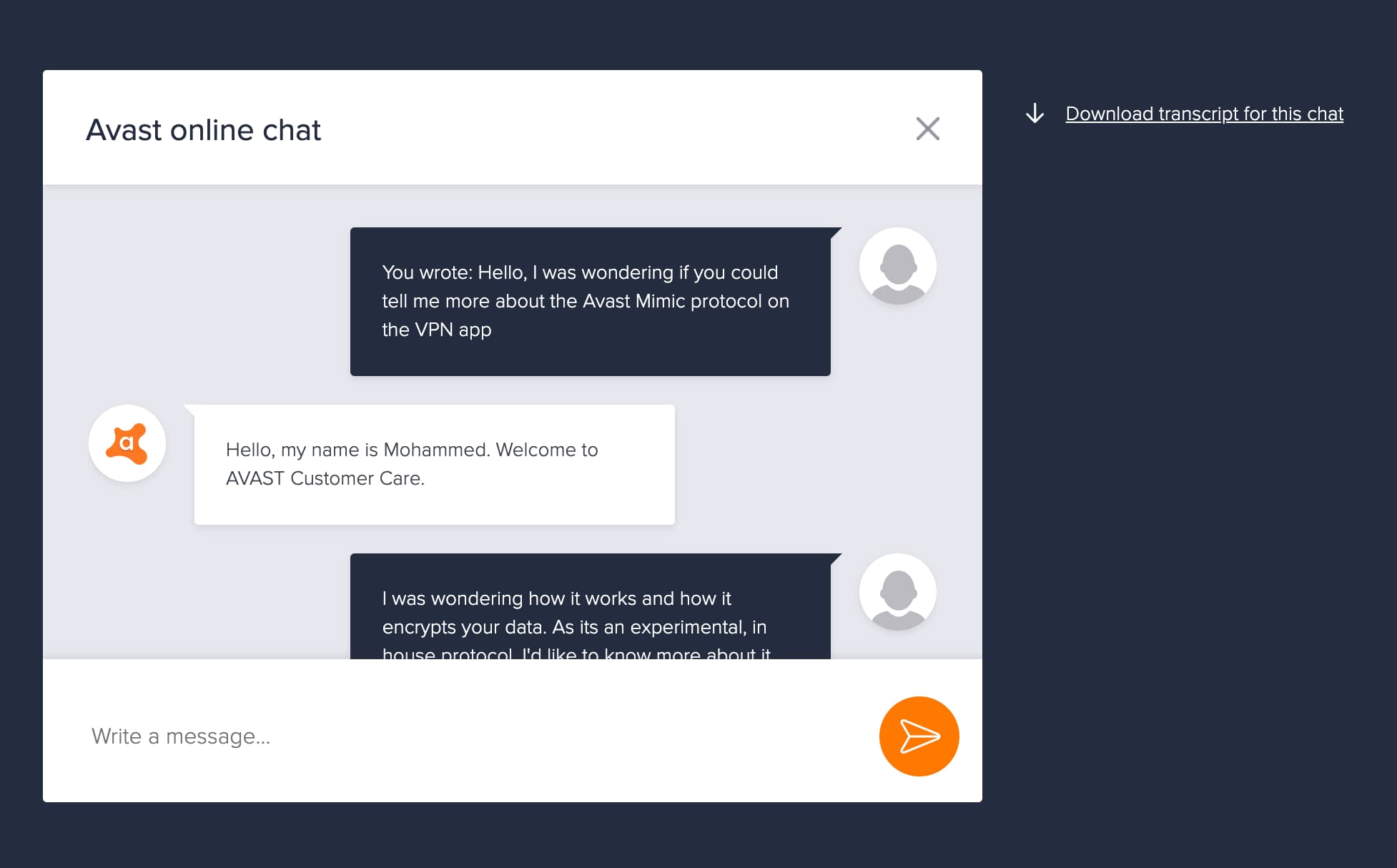
Avast has invested in a 24/7 live chat support system.
Customer support is good and effective. There is a live chat feature available 24/7, and it allows you to download transcripts for future reference.
Support was polite, if a little robotic. They were slow in responding, which implied they didn’t have the knowledge to hand. But the knowledge they did eventually send was helpful and informative.
You cannot access live chat instantly like you can with some VPNs, though. You have to click a few options and fill out a form beforehand.
What was impressive is that we received a follow up email the next day from support expanding on the agents answers, without us ever having to ask:
“I’ve reviewed your live chat correspondence and I see that a question was unanswered regarding our servers.”
It proceeded to offer a more comprehensive answer. This shows initiative from Avast, and a desire to please its customers.